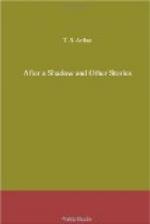One evening, instead of going with his sister to the house of a friend, where a select company of highly-intelligent ladies and gentleman were to meet, and pass an evening together, Martin excused himself under the pretence of an engagement, and lounged away to an eating and drinking saloon, there to spend an hour in smoking, reading the newspapers, and enjoying a glass of ale, the desire for which was fast growing into a habit. Strong and safe as he imagined himself, the very fact of preferring the atmosphere of a drinking or billiard saloon to that in which refined and intellectual people breathe, showed that he was weak and in danger.
He was sitting with a cigar in his mouth, and a glass of ale beside him, reading with the air of a man who felt entirely satisfied with himself, and rather proud than ashamed of his position and surroundings, when his pleasant friend, Mr. Bland, crossed the room, and, reaching out his hand, said, with his smiling, hearty manner,—
“How are you, my friend? What’s the news to-day?” And he drew a chair to the table, calling at the same time to a waiter for a glass of ale.
“I never drink anything stronger than ale,” he added, in a confidential way, not waiting for Green to answer his first remark. “Liquors are so drugged nowadays, that you never know what poison you are taking; besides, tippling is a bad habit, and sets a questionable example. We must, you know, have some regard to the effect of our conduct on weaker people. Man is an imitative animal. By the way, did you see Booth’s Cardinal Wolsey?”
“Yes.”
“A splendid piece of acting,—was it not? You remember, after the cardinal’s fall, that noble passage to which he gives utterance. It has been running through my mind ever since:—“’Mark but my fall, and that that ruined me.
Cromwell, I charge thee, fling away ambition:
By that sin fell the angels; how can man, then,
The image of his Maker, hope to win by’t?
Love thyself last: Cherish those hearts that hate thee:
Corruption wins not more than honesty.
Still in thy right hand carry gentle peace,
To silence envious tongues; be just, and fear not.
Let all the ends thou aim’st at be thy country’s,
Thy God’s, and truth’s; then if thou fall’st, O Cromwell,
Thou fall’st a blessed martyr.’
“’Love thyself last.—Let all the ends thou aim’st at be thy country’s, thy God’s, and truth’s.’ Could a man’s whole duty in life be expressed in fewer words, or said more grandly? I think not.”
And so he went on, charming the ears of Green, and inspiring him with the belief that he was a person of the purest instincts and noblest ends. While they talked, two young men, strangers to Green came up, and were introduced by Bland as “My very particular friends.” Something about them did not at first impress Martin favorably. But this impression soon wore off, they were so intelligent and agreeable, Bland, after a little while, referred again to the Cardinal Wolsey of Booth, and, drawing a copy of Shakspeare’s Henry VIII. from his pocket, remarked,—




